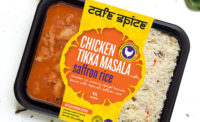A return of epic ProPortion
With a catastrophic fire in its past, ProPortion Foods' future includes strong growth and a state-of-the-art new facility.








When ProPortion Foods decided that it would leave its Los Angeles home for a new, larger facility in Round Rock, Texas, the family-owned business worked out a plan. The company would gradually wind down production at the larger of its 2 plants in California while ramping up production in Texas. It would transfer its equipment and operations, one line at a time, from the old facility to the new. New employees would be steadily brought in, and the entire operation would have been transferred smoothly over the course of about nine months.
That was the plan, at any rate.
What actually happened was this: less than a week after the Round Rock facility opened, with the bare minimum of employees and equipment in place, the company’s Los Angeles plant burned down in a fire. The company lost all its inventory and equipment in Los Angeles, and its plans for an orderly transition had to be changed overnight.
It may seem like an impossible task, but the four cousins who are partners in the business got to work. They spoke to their customers, ordered new machinery and trained employees as quickly as possible. They got through the immediate crisis period without shorting an order or losing a customer. Today, 20 months removed from the fire, ProPortion has put the past behind it and is focusing on its bright future.
“In 2019, we are on track to exceed our volume and sales pre-fire. Twenty short months afterward, we are doing as much or more on a weekly basis than we did pre-fire. We’re pretty proud of that,” says Brian Levy, one of the four partners.
ProPortion Foods operates two facilities. The Round Rock location, which serves as the new corporate headquarters, is 210,000 square feet in size, almost three times the size of the old L.A. plant. The company also operates a 50,000-square-foot plant in Vernon, Calif. The company has the know-how and capabilities to produce everything from frozen fully cooked burger patties to artichoke-stuffed chicken breasts. It has cooking, searing, char-broiling, kettle cooking and cook-in-bag capabilities for its foodservice and retail customers as well as raw portion control value-added capabilities. Convenience, quality and the ability to make strong relationships are ProProtion’s hallmarks. The company did not know how valuable those relationship skills were until it was put to the test.
Leaving California
ProPortion’s origins start in two other California businesses. The four partners, all first cousins (or in Levy’s case a cousin by marriage), worked in two different family businesses. Levy and Todd Waldman were at United Food Group, a grinding operation. Jay and Greg Wiviott were at Choice One Foods, which produced value-added, whole-muscle proteins. Both businesses were eventually sold — United to a capital investment group, Choice One to ConAgra Foods — and the four decided to start a new business venture.
“We had a very loose business plan from the word go, which was to try to take the best of what we knew from United Food Group and the best of what we knew from Choice and combine them into one enterprise,” Levy explains. “What we always knew was that we had terrific relationships with customers; it was those relationships that we planned on building our business, and we set off to do it.”
Starting with their own capital, ProPortion Foods began operations in Los Angeles in December 2009. Since then, the company has built a large customer base that includes retailers like Kroger, Costco, Walmart and Albertsons, as well as a number of foodservice customers. Five years into its operation, the partners realized that ProPortion needed a larger plant. A smaller facility in Vernon helped to relieve some of the workload, but growth was needed, and it would have to be outside of the Los Angeles area.
“There were all kinds of different challenges in the Southern California area, and ultimately we came to the conclusion that we needed to look elsewhere,” Waldman says.
The resulting search narrowed down to a facility in Round Rock, which is located about 20 miles north of Austin. It was a former Sysco warehouse that wasn’t designed for processing but had plenty of space.
“One of the reasons this building really worked for us was that it had a really capable holding freezer and cooler and a nice shipping and receiving dock,” says Jay Wiviott. “We converted approximately 50,000 square feet of space into brand-new, box-in-box processing space [a processing facility located within the walls of the existing building]. Through that, we were able to design process efficiencies into the flow here that we never had in our L.A. facility. In addition, we were really able to implement the best food safety practices from a product handling and employee management [standpoint].”
The Round Rock plant opened on March 27, 2017 with a total of 11 employees on hand. It was a quiet start.
“Jay at one point went downstairs and turned on a piece of equipment just so there was some noise,” Levy remarks.
One week to the day after Round Rock opened, the ProPortion Foods plant in Los Angeles was destroyed in the fire. All its inventory and equipment were a total loss. Waldman and Greg Wiviott were on hand in Los Angeles dealing with the immediate aftermath. Jay Wiviott was in Round Rock, and Levy was in Bentonville, Ark. preparing for a sales meeting. They were tasked with calling their customers to let them know what was happening, as well as calling equipment manufacturers to get machinery to Texas.
“Much to our surprise and to our pleasure, we had equipment manufacturers and partners, people that we’ve known for years and years, put equipment on trucks that next day to send here,” Levy notes.
As production shifted to Vernon and ramped up faster than anticipated in Round Rock, ProPortion was able to fulfill every single order at first. After several months, the partners did have to make some hard decisions about what products they were able to make. One of the casualties was ProPortion’s own branded products — a line of heat-and-eat entrees marketed under the Naples Kitchen brand.
“Restaurants can’t run out of a product,” Levy reasons. “If you’re selling taco meat to a quick-service restaurant, you can’t stop selling them taco meat. They need that every single day. If the product you made for a retailer is off the shelf for a month or two, it may hurt them, but it doesn’t stop people from coming into their grocery stores. They can still operate the grocery store without that one item on their shelf.”
“Whether it was the right decision or the wrong decision, we put our own brand last. We put all of our other customers first,” adds Wiviott.
Finding employees is a perpetual problem for many industries, not just the meat industry. In the case of ProPortion Foods, the company had to find 300 employees very quickly, in an area with low unemployment rates. It had put together a generous relocation package for any California employee who wanted to move to Texas, and some 30 workers took the offer.
After working with multiple staffing agencies to bring in people, the management put together a plan to become an employer of choice in the area and eliminate an unsustainable high turnover rate.
Waldman says that the company listed higher-paid positions in the workforce that would all be filled in-house. Employees who were willing to stay and take on more responsibility would be better compensated. It also introduced several programs that rewarded temporary workers for staying with the company, culminating with full-time employment at ProPortion Foods.
“We put together a footwear incentive program. Once an employee hits 30 days, they have the option of choosing between one of three different high-quality work boots, which we pay for 100 percent,” he says.
At 90 days, employees get the permanent hire paperwork packet, and at 120 days, they can become a full-time employee, with a full benefits and insurance package. As a result, most of the employees at the facility have been there from six months to more than a year, bringing some much-needed stability to the operation.
“What we find today is that we have employees who don’t leave, which is what our historical experience is. If you look at the situation in our Vernon facility, virtually all the employees are long-term employees,” Waldman explains. “We’re trying to create that same experience here in Round Rock.”
A family affair
In the 90 days following the fire, Levy says that there was never enough time in the day for the four partners.
“We worked almost around the clock. We worked in the facility and then in our offices at home at night, doing whatever we had to do to make it happen,” he recalls.
In spite of the task ahead of them, shutting down the business entirely was never an option. Rather, Wiviott says that they took the opposite approach.
“We said, ‘We don’t want this to end, we want to make sure our employees are taken care of, we want to make sure everyone has a long-term profession,’ and we did everything in our power and then some to continue the operation,” he says.
All four of the cousins have a share of the workload. Levy oversees sales and marketing, as well as day-to-day administration. Waldman handles the Vernon operation and the legal and administrative aspects. Greg Wiviott takes care of protein procurement, and Jay Wiviott oversees the Round Rock operation and research & development/commercialization projects.
Clearly, there is no such thing as a “silent partnership” in the ProPortion Foods’ management structure. Each partner has an active role in the company, and customers know that they can always pick up a phone and call an owner if necessary. Though the company has large customers and produces more than one million pounds of products per week, ProPortion Foods still operates like a small business.
“As more and more companies consolidate and the industry consolidates, I think people are concerned that the industry will lose that personal touch. I think that our customers really enjoy the fact that they get a very personal touch with ProPortion Foods,” Wiviott says.
Now that the Round Rock facility is properly staffed and stocked with processing equipment, the company can look to the future once more. There are several installation projects scheduled to take place in the first part of 2019, including a kettle cooking operation and a sear line. All of the utilities, from water to electricity, are designed with expansion in mind to make further expansion easier.
ProPortion Foods has within the last year brought in several new customers and expanded upon some existing relationships. Its expertise in producing high-quality, convenient foods is a perfect fit with today’s consumer trends. Fully cooked entrees like Hawaiian Chicken, Cranberry-Apple Stuffed Turkey or Braised Beef — or a meal kit with an entrée, sauce, starch and vegetable — allow consumers to eat and enjoy a meal with a minimum of preparation time. The company plans on expanding its product range this year with its retail customers and growing its Naples Kitchen brand once more. It is working with more foodservice customers to develop new and convenient products as well.
Levy has always been proud of the relationships the company has fostered with its customers and vendors, but he says the last 18 months have brought out the best in the industry.
“There were people we worked with for years and always considered friends, but you never really know how deep that relationship is until you’re hit with adversity. We were certainly hit with adversity, and our vendor friends and customer friends all rallied around us” Levy says. “We owe them our business, because they stuck with us.”
Looking for a reprint of this article?
From high-res PDFs to custom plaques, order your copy today!











